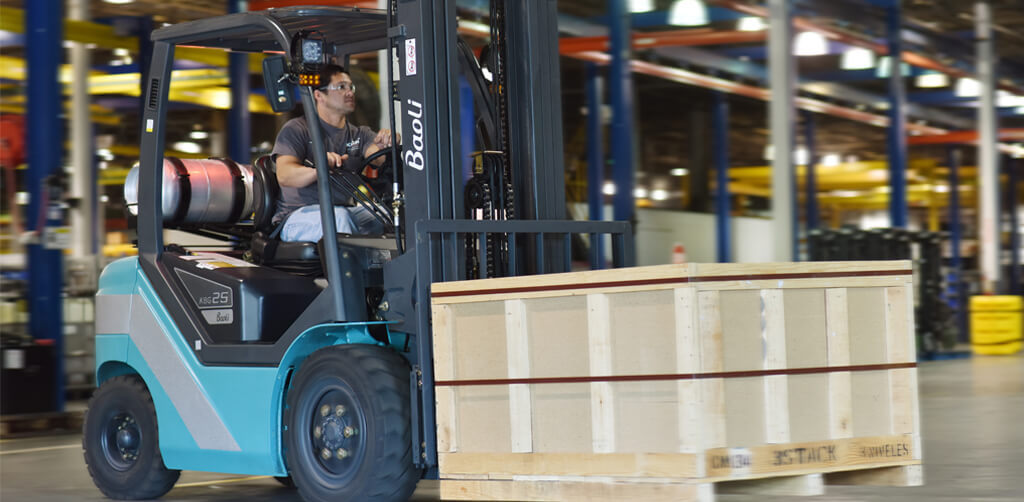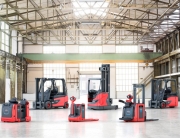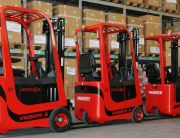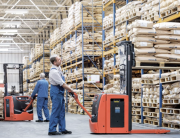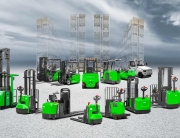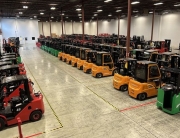Whether your business is in manufacturing, shipping, logistics, or other related industries, you know that forklifts are vital for efficient operations. They are beneficial for warehousing, moving heavy goods, and maintaining safety by preventing much strain on your employees. Once you’ve decided on investing in a forklift, you’ll find that there is a range of different power options to choose from.
What kind of fuel do forklifts use?
There are a few different kinds of fuel forklifts use in the market today. The most common are diesel, LPG and electric. There are also Hydrogen or Gasoline powered forklifts but these are fewer in number to the Diesel, LPG or Electric units in the market today. They each have their performance differences for different work environments, so your choice comes down to what your priorities are. When choosing a forklift, the type of fuel source you choose comes down to a few factors:
- Ease of use – is there sufficient voltage on site for a charger to be installed?
- Operational techniques – ramps, grades, wet environments, Cold or Hot Temperatures
- Operating expenses such as maintenance – Electrics are lower cost to maintain vs IC
- Environmental impact – for indoor use many people prefer the cleaner electric fuel
- Work capabilities – do you do a lot of heavy lifting or pushing?
Electric vs Internal Combustion (IC) forklifts
Yes, they both do the same job but understanding the pros and cons of each can help you better decide on which is right for your work environment.
Electric
Electric forklifts have been around for a while but really started gaining popularity in the past 10 to 15 years. They are much more commonly used indoors so in large metropolitan centers you will mostly find Electric Forklifts running in warehouses and Manufacturing plants. Currently approximately 70% of the lift truck market is Electric and that number still has room to grow as manufacturers are looking to make even their large outdoor forklifts Electric Powered. This trend towards electrics and away from Fossil Fuels is largely due to the rising costs of fuel and growing awareness of environmental issues. Electric Forklifts run entirely on rechargeable batteries instead of fuel tanks. The most common Battery type used today is still Lead Acid Rechargeable batteries. They can run up to 18 hours a day when opportunity charged and only require minimal maintenance but for those looking for NO maintenance on the batteries Lithium Ion Technology is another excellent option. Li-Ion batteries require no maintenance and can be charged much faster meaning even more runtime but they do come at a higher cost than lead acid so some analysis should be done before deciding which is right for your operation.
Advantages
Electric Forklifts are cleaner, easier to refuel, and have quieter operation compared to internal combustion types of forklifts making them ideal for indoor operations
- They can be the same size or even smaller than IC alternatives and are easier to operate
- They produce zero emissions which creates a safer environment for employees to work in and better for the planet
- Charging a battery may cost $2-3.00 vs a $35 LPG Tank or $65 Diesel refuel. This can mean SIGNIFICANT fuel savings with Electric vs IC and can save up to $30,000 over 5 years in a 5000 lb capacity forklift if running for 6 hours a day, 5 days a week for example.
- They have lower maintenance and repair costs due to an absence of engines, radiators, or transmissions
- Power Pallet trucks, Order Pickers, Reach Trucks and small 3 wheelers can ONLY be electric as there is no room for an engine in these types of units – they are only possible because they are electric.
Common disadvantages
- Some Makes and Models can’t be used outside or in wet/cold weather for prolonged periods.
- They can’t be used during charging periods and may slow down productivity
- Their Batteries need to be replaced about every 5-7 years and are expensive to purchase
- Changing batteries can be difficult and dangerous as they weigh over 1,300kg
- They may save you costs on gas, but the initial purchasing price can be expensive
- They may occasionally have a hard time reaching high speeds or making it up ramps
The Ri-Go Lift Truck Advantage: Our electric forklifts range from 24 to 80 Volt systems and can handle the toughest environments, including outdoors. Keep your warehouse clean and reduce your facility’s environmental footprint with an electric forklift from our showroom.
Diesel and Internal combustion Forklifts
Diesel forklifts are some of the toughest workhorses in the material handling industry and are used in a wide range of applications. They are designed to withstand tough, wet, and dirty outdoor conditions. They are also suited for container stuffing and moving goods in or out of storage areas.
Advantages
- They are usually cheaper than electric forklifts to purchase
- They are considered better in industrial applications or carrying heavier loads
- They are durable for outdoor use and in wet or Hot or Cold Climates
- They are built with more power and better acceleration and are better for going up steeper ramps
- They tend to last longer than alternatives which give you more return on your investment
Disadvantages
- They emit toxic fumes which may cause discomfort and health issues for your employees in spaces with poor ventilation
- They’re not easy to operate around corners and tight spaces as they tend to be bulkier in size
- Their loud engines may make it difficult for your employees to communicate
- The cost of diesel is expensive and may increase over the years
- Maintenance costs are higher with Internal combustion vs Electric
- It is the least environmentally friendly compared to other types of forklifts
Should you Rent or Buy a forklift?
We sell and rent out different kinds of forklifts to our customers. Buying or renting, each has its advantages for your business.
Why should you buy a forklift?
- You’ll get the full return on your investment compared to long-term rental fees and monthly financing costs. Purchasing is lower cost in the long run.
- Purchased forklifts can be eligible for tax deductions
- You can make customizations based on your needs
- You can resell your forklift whenever you see fit
- No usage limits
Why should you rent a forklift?
- It’s typically much cheaper in the short term vs buying outright if capital is tight
- It’s easier to upgrade to the newer models with no long-term commitments – more flexible in case your needs change and you need a different capacity or size of unit
- Rentals normally include maintenance meaning less surprise maintenance costs.
- Rentals can be arranged seasonally or only as needed and returned when it is no longer needed
Why Forklift Training is important
Having proof of forklift operator training is required by law in Ontario. Ri-GO Lift Truck Ltd offers fully compliant on-site material handling training courses which can be tailored to your type of forklift and company’s needs. Why is training important? For yours and your employee’s safety. With the improper operation, comes hazards. The benefits of taking our forklift training classes include:
- Increased employee confidence and better productivity
- Knowing what types of forklifts can be used in different warehouses
- Reduced chance of risk and inventory loss due to improper handling of goods
- Less machine damage due to proper handling and maintenance
Are you still deciding between electric forklifts and Internal Combustion forklifts? We have thousands of different kinds of forklifts for sale and over 1100 units available for rent. With partnerships with many suppliers around Ontario and our experts to consult, you’re guaranteed to find the right lift truck for your operations here. Contact us today to find the right lift truck or other warehouse and safety equipment for your business.



